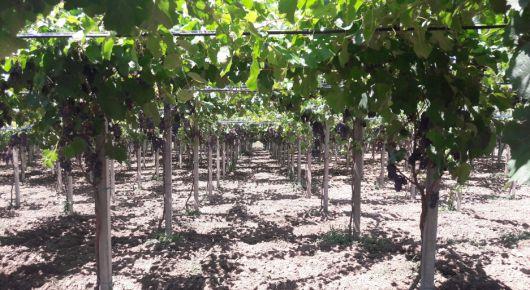Moldovan agriculture has become more resilient to natural disasters

Moldovan authorities and FAO have successfully implemented a four-year project to increase drought resilience amongst small-scale farmers by helping them adopt modern irrigation technologies and best practices.
At the closing event, held today in Chisinau, FAO and the minister of Agriculture, Rural Development and Environment brought together a variegated set of participants – including representatives from the ministry, extension agencies, and farmers’ organizations – to present the project’s specific achievements.
The implementation of the project was made possible due to financial support from the Hungarian Government as a response to increased and worsening drought events, which pose a serious risk to the agriculture sector and water availablity, directly impacting food security and the rural economy.
“Hungary considers the Republic of Moldova as a friend, and we hope that this project is a proof of that,” said Aniko Juhász, deputy state secretary from the Ministry of Agriculture of Hungary, speaking on the occasion. “We are delighted that the Hungarian help came at a time when it was needed the most. We are interested in being able to transfer the knowledge we have accumulated to the widest possible extent. We do believe that there is still a lot of untapped opportunities in the agricultural sector. Hungarian companies are ready to take part in the modernization of Moldovan agriculture with the supply of state-of-the-art technologies.”
The Moldovan Government, with the help of donors, had previously rehabilitated centralized irrigation systems. This was underlined by Iurie Usurelu, secretary general of state with the Ministry of Agriculture, Rural Development and Environment.
“However, farmers needed support to adopt irrigation at the on-farm level and to be able to make the best use of the improved system,” he said. “FAO, as a knowledge-based organization, has a wealth of information and expertise on best irrigation practices and was very well placed to carry out the project, and we are grateful for the results.”
Ten demonstration sites with water management technologies were established in the central and southern parts of the Republic of Moldova, regions that are most exposed to recurrent drought events. The small-scale farmers owning the sites benefited from modern irrigation equipment and received training on its proper operation and maintenance.
The demonstration plots played host to field demonstration activities, such as farmer field schools and field days, where more than 350 other farmers learned the positive impacts of irrigating their own fields in the best possible way, and the best practices for doing so.
The project also supported 380 local extension specialists and representatives of water users associations through trainings, strengthening their capacities in modern on-farm irrigation technologies and best practices. After the project ends, they’re expected to continue the mission of promoting the benefits and uses of modern irrigation systems among farmers and helping them with climate change adaptation.
“The wide dissemination and adoption of best irrigation practices will contribute to the sustainable management of land and water resources in the context of climate change,” said Raimund Jehle, FAO Representative in the Republic of Moldova. “Increased productivity means improved incomes and livelihoods of smallholders.”
The project is an important contribution to the achievement of the Sustainable Development Goals in the country, increasing food security and reducing poverty, Jehle added.
“Particularly, the support to smallholder development within the framework of FAO’s regional initiative on smallholders will be a contribution to increase the competiveness of the sector in a sustainable manner,” he said.
Project activities promoted national ownership and local empowerment in the agricultural sector in alignment with National Disaster Risk Management Strategy (2014–2020) and the new Agriculture and Rural Development Strategy (2014–2020).
10 October, Chisinau, Republic of Moldova
